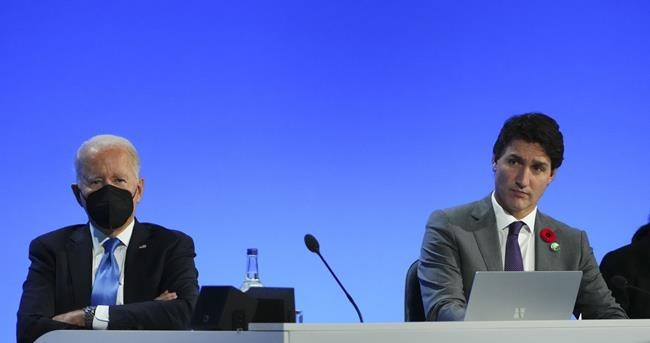WASHINGTON — The federal Liberal government was lulled into a false sense of security by the results of last year's U.S. election, say business leaders who want Prime Minister Justin Trudeau to take a harder line with President Joe Biden when he visits the White House this week.
Canadians might have expected a smoother ride following Donald Trump's defeat, but experts say the events of the last 10 months — beginning with Biden's Day 1 cancellation of the Keystone XL pipeline project — suggest the Canada-U.S. relationship has drifted off the road.
"We had, collectively, somewhat of a cruise-control approach to this relationship," said Goldy Hyder, president and CEO of the Business Council of Canada.
"We all succumbed to a sense of, 'Life's going to be perfect again, it's going to be good again, they love us, we love them and it's going to be a really happy relationship.' The facts suggest that it's quite the contrary."
Those facts comprise a long list of sore spots for Canada that only seems to be getting longer.
In addition to Keystone XL, the Biden administration has shown little enthusiasm for Line 3 and Line 5, two key cross-border upgrade projects spearheaded by Calgary-based Enbridge Inc. that have been the targets of widespread protests and legal action in the U.S.
And the president frequently uses protectionist "Buy American" rhetoric to assure working-class voters that his government's infrastructure overhaul will rely primarily on U.S. contractors and suppliers, with stringent conditions for any foreign involvement.
That language showed up again Monday as Biden signed into law his $1.2-trillion infrastructure bill, which included a separate set of executive marching orders calling on the government to "buy American and increase the competitiveness of the U.S. economy, including through implementing the act's made-in-America requirements and bolstering domestic manufacturing and manufacturing supply chains."
Heading off U.S. protectionism will be a top priority, Trudeau suggested Monday.
Buy American "poses a particular challenge not only for companies and workers here in Canada, but also in the United States, because of the integration of our supply chains and our economies in general," he said in French.
"It really is counterproductive for Americans to put in place even more barriers and limitations on trade between our two countries."
Canada's auto industry is also up in arms over a proposed U.S. tax credit for electric vehicles, worth up to $12,500 to would-be buyers, that critics — including foreign automakers — say is unfairly geared toward American-made vehicles built with union labour.
Hyder also cited a lack of advance notice on the chaotic U.S. pullout from Afghanistan, a deal with Australia to provide nuclear-powered submarines that appeared to cut Canada out of the loop and the three-month disconnect on the reopening of the Canada-U.S. land border.
None of that points to a healthy bilateral relationship, Hyder said.
"I'm far more interested in the state of the relationship coming out of an event like this then I am whether we made progress on this piece of legislative action or that piece of legislative action," he said.
"Friends are supposed to be able to have straight talk, honest talk. I'm not measuring the relationship based on is it buddy-buddy, chum-chum, are they high-fiving. I want outcomes for the Canadian people and our Canadian interests. That's what I'm looking for."
Democrats are facing political headwinds at home that won't help matters.
Inflation in the U.S. now exceeds six per cent and gasoline prices across the country are spiking, thanks in part to a lingering COVID-19 hangover and related supply-chain issues that are hitting Americans just as the holiday shopping season shifts into high gear.
Biden's approval ratings are dismal, and strong Republican performances in recent gubernatorial elections in Virginia and New Jersey make it clear they will face an uphill battle next year in maintaining control of Capitol Hill, to say nothing of the White House in 2024.
Given that, it might be wise for Canadians and Mexicans alike to temper their expectations of Thursday's meeting, said Duncan Wood, a Wilson Center vice-president and senior adviser to the centre's Mexico Institute.
All three countries are still in the process of repairing the damage that was done during the Trump era — and progress on that front might be the single most important goal, Wood said.
"There's value in just having a conversation," he said. "It's just that what that conversation will produce in the short term — I think there's not a lot that can be expected there."
It's long been the nature of the relationship that Canada must voice its priorities in order to get U.S. attention — and align those priorities with American goals in order to get action, said Maryscott Greenwood, CEO of the Canadian American Business Council.
"In Washington, when the dialogue is dominated by internal politics, Canada and Mexico are left on the sidelines. The truth of the matter is, Canada and Mexico can help solve some of the internal U.S. political challenges, like infrastructure, like energy co-operation," Greenwood said.
"It may be remarkable to Canadians that you've got to keep reminding, but we've got to keep reminding. We've got to have that conversation."
This report by The Canadian Press was first published Nov. 15, 2021.
James McCarten, The Canadian Press




